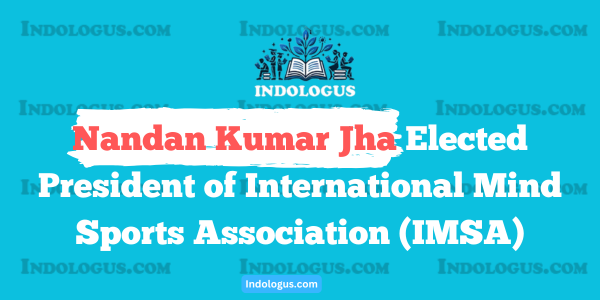In a historic development for India and the global mind sports community, Nandan Kumar Jha has been appointed as the President of the International Mind Sports Association (IMSA). The announcement was made during IMSA’s annual general assembly held in São Paulo, Brazil. Jha’s appointment reflects the increasing recognition of India’s influence in the field of intellectual and strategic games.
Key Highlights of the Appointment
- Election Details:
- Nandan Kumar Jha was nominated by the World Draughts Federation and elected during IMSA’s annual meeting in Brazil.
- IMSA Overview:
- IMSA governs and promotes mind sports globally, including chess, draughts, esports, poker, go, and bridge.
- The organization works in partnership with the International Olympic Committee (IOC) and other sports federations to integrate mind sports into the mainstream.
- With over 200 member countries, IMSA serves as a global platform for advancing intellectual games.
- Sports Representation:
- IMSA currently oversees nine mind sports, making it a significant body in the global sports ecosystem.
Nandan Kumar Jha’s Vision for Mind Sports
Jha is committed to making mind sports inclusive and accessible, with the goal of inspiring individuals globally to participate in these disciplines. Under his leadership, IMSA aims to:
- Foster global awareness of the cognitive and cultural benefits of mind sports.
- Expand opportunities for participation across age groups, geographies, and skill levels.
- Integrate mind sports into educational systems and mainstream sports platforms.
Jha’s passion for intellectual games aligns with IMSA’s mission of promoting mental agility, strategy, and cultural enrichment through these sports.
Impact and Future Prospects
Jha’s leadership is expected to enhance the visibility and significance of mind sports on the global stage. IMSA CEO Geoffrey Borg highlighted Jha’s potential to implement impactful initiatives, noting his ability to make these games more inclusive and widespread.
This development marks a pivotal moment for India’s growing influence in international sports governance, particularly in the domain of intellectual and strategic disciplines. Jha’s tenure could pave the way for innovations that bridge cultural divides and inspire a broader appreciation for the mental and strategic rigor these games represent.
Conclusion
Nandan Kumar Jha’s appointment as President of IMSA is a testament to India’s expanding footprint in the realm of mind sports. With his vision and leadership, IMSA is poised to drive global recognition and growth for these disciplines, reinforcing the importance of mental agility in sports.




